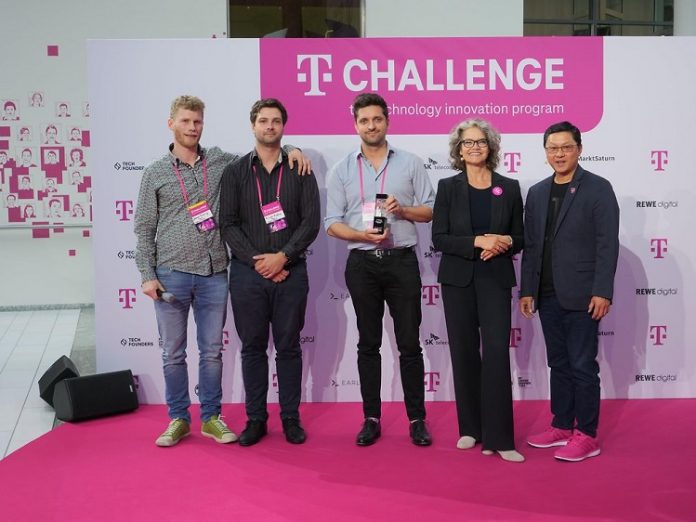
Trends such as Web 3.0, virtual reality and avatars will change shopping and service. This year’s T-Challenge, the international competition organized by T-Labs and T-Mobile US, wanted to find out exactly what this might look like.
Selected from hundreds of applicants from all over the world, 19 finalists from eleven countries had the chance to convince the jury and receive a share of the prize money totaling over EUR 600,000.
The winning projects
The winner of the “Solution Development” category is Team Graffiti from Marseille, France. They use AR to bring the product experience familiar from the online world, with additional information and recommendations, etc., to the local store.

In second place is the SightCall team from Frankfurt. SightCall turns the smartphone into a powerful self-service tool by smartly extending a web channel, for example, with a video call with an advisor.
Third place is DeepBrainAI from Seoul/ Korea with their technology for programming impressively lifelike avatars. Based on video footage, they create digital twins that convince with deceptively human-like gestures, facial expressions and speech in customer service, for example.
In the “Concept and Design Creation” category, Golem Digital from Graz, Austria, was the winner. Their idea of the ByeByeQ solves the problem of waiting times in the store by networking waiting customers with free advisors in other stores using smart glasses or XR-Booth (a kind of telephone booth with AR technology).
Second place went to the Code University team from Berlin. They focus on enhancing and enlivening digital stores through art.
In third place was Yona from Cologne with their practical solution to the fact that there is usually one tech expert in a family who sets up all the devices and solves problems when something doesn’t work. In a digital twin of the home with all its devices, AR advisors help with tips and tricks.
“We started our second T-Challenge with great expectations. The participants’ ideas far exceeded them. For example, we received solutions such as lifelike avatars paired with applications that are perfectly tailored to the needs of our customers. This enables us to further improve our service. We want to inspire people and act in line with their needs. I have seen a lot today that precisely meets this objective,” says Claudia Nemat, Member of the Board of Management for Technology and Innovation at Telekom.
Interactive exhibition presents solutions
For two days, the finalists of the T-Challenge presented how sales and service are developing in the virtual world at Telekom’s headquarters in Bonn. Jury members, Telekom experts, partners and visitors were able to create their own avatar in a 3D scanner or test whether they could tell a virtual person from a real one.
They could stroll through a virtual 100-story mall or see how retailers can improve their service at peak times. Or see for themselves how a virtual flagship store combines the personal experience of brick-and-mortar retail with the convenience of online shopping.
“5G is poised to unlock the true potential of Extended Reality, transforming the way we interact with the world around us – including the way we shop,” said Neville Ray, President of Technology at T-Mobile US “T-Challenge gives us a glimpse into the future with XR, and I can’t wait to see these innovators take their ideas to the next level.”
The T-Challenge
In 2021, T-Labs, Deutsche Telekom’s research and development unit, launched the T-Challenge. The second edition was held jointly with T-Mobile US.
In addition to the attractive prize money of EUR 150,000 (Solution Development) and EUR 75,000 (Concept and Design Creation) for the first-place winners, participants* have another attractive bonus in store: Selected winning solutions will be exhibited in selected Telekom stores in Germany, Europe and the USA.
Telekom and extended reality (XR)
Telekom has been actively involved in further developing XR technology and exploring its possibilities for years. It was the first telecommunications company in Europe to bring Nreal’s mixed reality glasses into its stores. hubraum programs for startups and developers continue to push the topic. For example, currently the Snapdragon Spaces program with Qualcomm and T-Mobile US. And of course, good networks, like Telekom’s, and 5G are the basis for a perfect experience in the metaverse.









